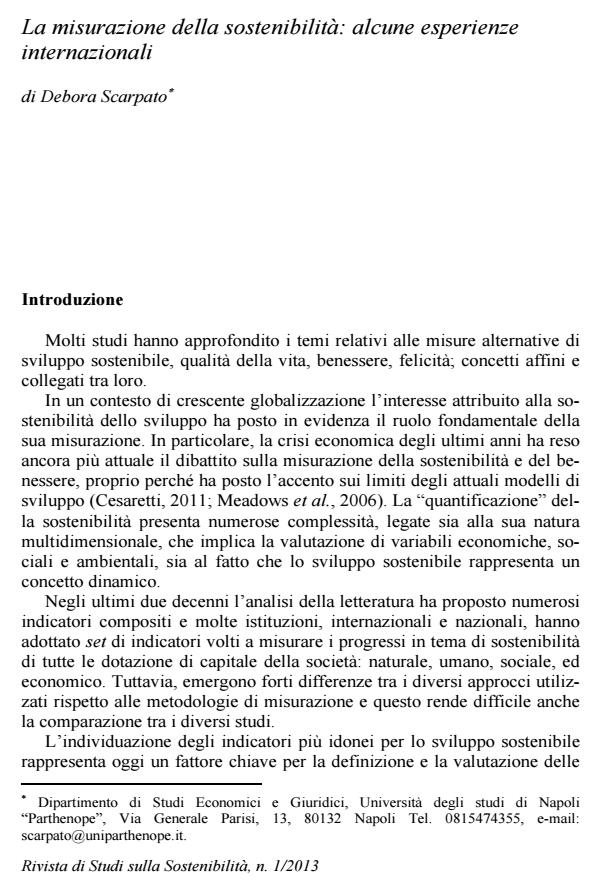Measuring sustainability: some international experiences
Journal title RIVISTA DI STUDI SULLA SOSTENIBILITA'
Author/s Debora Scarpato
Publishing Year 2013 Issue 2013/1
Language Italian Pages 22 P. 55-76 File size 303 KB
DOI 10.3280/RISS2013-001005
DOI is like a bar code for intellectual property: to have more infomation
click here
Below, you can see the article first page
If you want to buy this article in PDF format, you can do it, following the instructions to buy download credits

FrancoAngeli is member of Publishers International Linking Association, Inc (PILA), a not-for-profit association which run the CrossRef service enabling links to and from online scholarly content.
The current international scenario, in part as a result of the global crisis, is characterized by a growing attention of society, policy makers and enterprises, towards the issues of sustainable development. In this context the role of measuring sustainability has become more important, as it allows the understanding of variations of all the capital "stock". This has led to the spread of a very high number of indicators in support of the decision-making process, not only for policy makers, but also for managers. The objective of this study is to analyse the salient aspects of the measurement of sustainability and the most significant experiences of some international institutions that have proposed sets of indicators for the evaluation of sustainability.
Keywords: Sustainability, Indicators, International institutions, Policy makers
- Does quality really matter? Variables that drive postmodern consumer choices Nicola Marinelli, Mariarosaria Simeone, Debora Scarpato, in Nutrition & Food Science /2015 pp.255
DOI: 10.1108/NFS-03-2014-0022 - Factors Affecting Food Label Complexity: Does the New EU Regulation Satisfy Consumer Issues? An Exploratory Study Mariarosaria Simeone, Debora Scarpato, Nicola Marinelli, in Journal of Food Products Marketing /2016 pp.571
DOI: 10.1080/10454446.2015.1121422 - Factors affecting consumer attitudes towards food products with sustainable attributes Azzurra ANNUNZIATA, Debora SCARPATO, in Agricultural Economics (Zemědělská ekonomika) /2014 pp.353
DOI: 10.17221/156/2013-AGRICECON - The challenge of Euro-Mediterranean integration for Campania agribusiness sustainability Debora Scarpato, Mariarosaria Simeone, Giacomo Rotondo, in Agricultural Economics (Zemědělská ekonomika) /2019 pp.539
DOI: 10.17221/18/2019-AGRICECON
Debora Scarpato, La misurazione della sostenibilità: alcune esperienze internazionali in "RIVISTA DI STUDI SULLA SOSTENIBILITA'" 1/2013, pp 55-76, DOI: 10.3280/RISS2013-001005